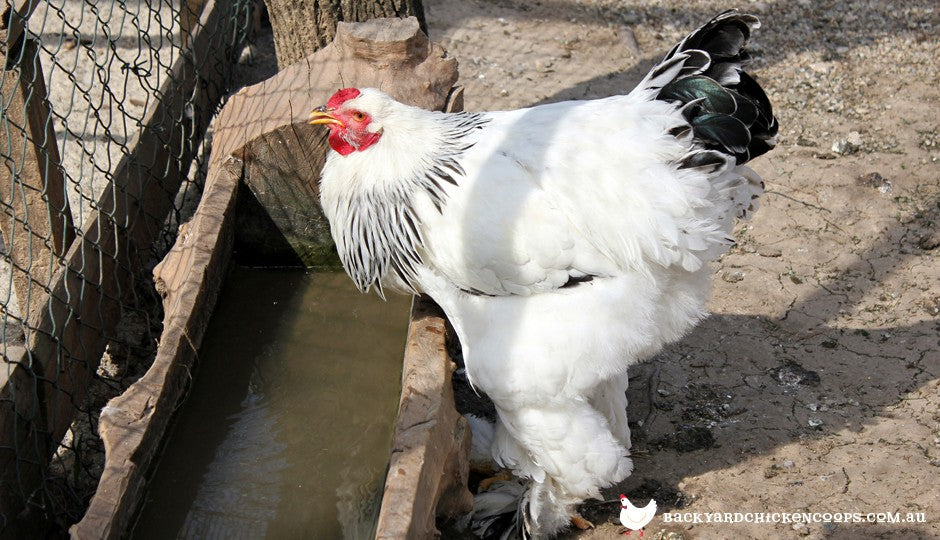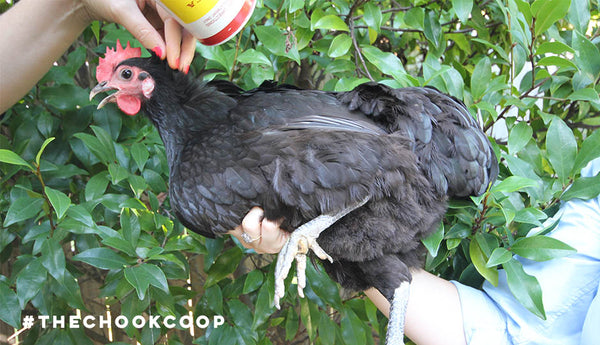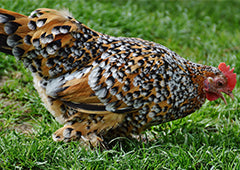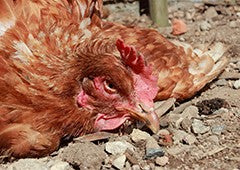As with any other pet, chicken health is very important. The good news is that most illnesses that your chicken may be at risk of contracting can be cured, provided you catch them in time. If you think for any reason that your pet chicken health is subjected to a chicken disease, it is always best to isolate them from the flock to avoid the risk of spreading any possible chicken disease further among your chooks. Remember that it's important that you continue to provide your sick chicken with easy access to fresh water and food.
It is also important to schedule an appointment with your local veterinarian immediately if your chicken displays serious symptoms. When keeping pet chickens you will need to take care to locate a vet that specialises in farm animals or avian medicine. It is actually a good idea to locate such a vet before you start keeping chickens in your backyard coop.
Possible Symptoms of Chicken Illness
There are a few symptoms that you should look for on a regular basis which could indicate that your chicken's health is at risk. These symptoms include:
- Visible mites and lice
- Excessive feather loss
- Respiratory issues like sneezing and wheezing breath
- Abnormal stool
- As distasteful as it might seem, you will need to examine your chickens' stool regularly. This will help you to become familiar with what your chickens' dropping should look like so you will know when there is a problem. Such possible problems might include droppings that are all white, diarrhoea, visible worms and the presence of blood. Normal stool should be primarily brown with a small amount of white.
- Lack of energy and loss of movement
- Loss of appetite
- Keep in mind that during extreme climate changes, such as a heat wave, your chickens may experience some loss of appetite.
- Stunted growth
- Sudden reduction in one chicken’s position within the pecking order
- You will likely notice right away that your chickens develop a pecking order. Anytime you notice that a chicken which was formerly higher in the pecking order of your flock has dropped in that pecking order, this should be cause for concern. Birds of all types, including chickens, often have a sense of when another chicken is ill and will frequently pick on them.
Chicken Disease Prevention
The best method for maintaining your chicken's health is to prevent disease in the first place. By following careful coop specifications and regular maintenance and care instructions you will have a much better chance of having a flock that is both happy and healthy. Keep in mind; however, that as is the case with any other animal or pet, chickens do run some risk of illness. This is why it is imperative to check on your flock daily. Doing so will help you to catch any sign or symptom of illness early on and greatly increase the chances of a good outcome.
Many people often have questions about bird or avian flu, also known as A(H5N1). This is a strain of bird flu that can quickly mutate into a disease that can be transmitted from one human to another. In most cases, you will not need to be concerned about such problems; however, if you choose to keep pet chickens you should be aware that if there is an outbreak of this disease in your local area, authorities may require that all pet birds be terminated.
When keeping pet chickens, it is important to always exercise good common sense. For instance, always wash your hands thoroughly after contact with your chickens. If you need to deal with droppings, wear gloves. You might also wish to use hand sanitise right after having contact with your chickens. Many people also prefer to use a specific pair of shoes when they go into the coop and then never wear those shoes indoors, to help prevent transferring faeces. This saves both, the Chicken's health and your family's too.
Coping with Chicken Death
While it would certainly be nice if we never had to deal with the subject to death when it comes to pets, death is inevitable for all living things. You might be quite surprised to discover how attached you become to your feathered pets and as a result, the death of one of your chickens can be difficult. When facing the death of a chicken, you need to know how to properly handle it. If the chicken died as the result of being attacked by a predator or from old age, you may handle it just as you would with the death of any other pet. Do be sure to bury a hole deep enough to bury it and ensure no predators are able to dig it up.
On the other hand, if the death occurred suddenly, if there was no apparent reason or if your chicken had seemed ill before dying, it is important to take some time to investigate the possible cause of death. Otherwise, you may face an epidemic and more deaths are likely to follow.
From hydration and hygiene to healthy diets, we all want to do an eggcellent job when caring for our feathered friends. It's essential that you've got the right knowledge you need to raise happy, healthy chooks. Did you know 67% of chicken keepers surveyed experienced a chicken health or behaviour issue in the first 12 months that they didn’t know how to handle?
But don’t worry! Our feathered friends over at Chickenpedia have created a Chicken Healthcare Course. It is a comprehensive online course that includes everything you need, including what to look for in an unhealthy chicken and how to support your egg-laying hens to optimal health. All of their courses are really well structured and filled with vital information, which is why I highly recommend them to all of my readers! From raising baby chicks to feeding to behavior, you’ll find valuable expert advice that’ll give you the knowledge and confidence to successfully look after your chickens.
Check out Chickenpedia today. As a member, you will also get access to the ALL of their chicken courses!
Learn more about keeping your flock happy and healthy with our top 5 natural health products countdown and handle and chicken injuries with our guide to a first aid kit for pet chickens here.


















